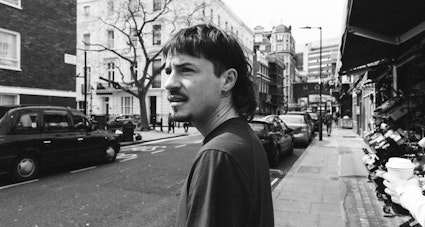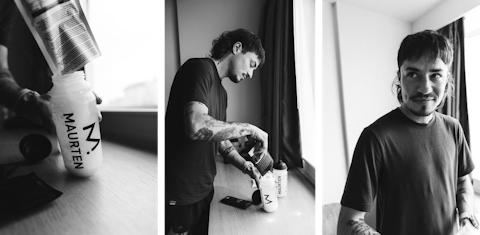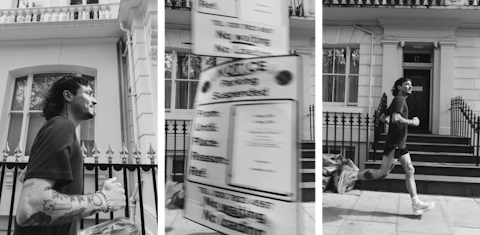
Cal Calamia — breaking down barriers
Human inclination is to accept the path of least resistance — no questions asked. To base our own opinions on the loudest rhetoric and be easily persuaded. For Cal Calamia — the first non-binary runner to complete all marathon majors — the most persuasive connections are made through real life interactions. “When I have the opportunity to tell my story — of who I am — and once people can sit face-to-face and have a conversation, there’s a realization that we’re actually a lot more alike than they thought we were, and that is super-transformative. That's something that I love about the sport of running that feels so aligned with my personal ethos for life, is that we are all so much more similar than we are different.”

There are 84 non-binary runners among 62,115 in the London Marathon results pages. A small group that’s marginalized further based purely on statistics — most people don’t have contact with a non-binary runner in their everyday lives. Rather than seek out information, apathy often means accepting the hyperbolic narrative. The process of allowing ourselves to be informed by others. The simple reality is that nobody else’s success was impacted by those 84 non-binary runners at the London Marathon. As in life, we all run our own race. “It’s polarization,” Cal states.
“I really believe that what's happening is people are receiving a certain message about who trans-people are, that actually has nothing to do with who we really are. So one of the biggest barriers to understanding is just a lack of storytelling. I think a lot of people are quick to dehumanize trans-folk. People are really just operating with such little information.”

At the heart of Cal’s activism is the basic principle of inclusion — for the world to honor the humanity and strength of trans athletes. A shift in societal conversation and mindset that welcomes non-binary runners to every start line. “I started running when I was about 12 years old, and I ran cross country in middle school, in high school, and in college. It was after I graduated that I started coming to terms with my gender, and that's when I started undergoing my gender transition. From there, when I turned back to the sport of running, I was kind of unsure how to proceed with, you know, being male or female. At registration, I didn’t know what I should do, so I started advocating for non-binary divisions — first local road races, and then all of the world marathon majors.”
“For a long time, I’ve had this dream to run all the majors, but it felt impossible before these divisions were added. So it's kind of wild to me to be here now, to be achieving this dream as my true self. I sort of see running as a microcosm for the world, and through this small act, in this relatively small community, we can start inspiring other communities to do the same thing to be more inclusive”

The tone and messaging directed at non-binary communities ranges from ignorant to hostile, making it precarious to form futureproof plans. To now have non-binary categories for athletes in all the major marathons is an important milestone for Cal to leverage.
“This feels like a special opportunity to shine a light on trans-excellence through my running and really to open the door for other people to do the same and achieve, rather than be a part of a negative conversation.”
Being prepared to put your face in the wind — to advocate for change — will always attract some level of criticism. And veiled by social media, unfiltered hostility can flow freely. It’s something that Cal needs to be mindful of — on the one hand stay current and hear what’s being said, while also being careful not to let certain voices crush motivation. “There are a number of people that, I think, don't understand the importance of including trans-people in the athletic world and I've definitely dealt with pushback from some races that don't see the value in adding the division. And online, people can really push back or be intentionally hateful, and that side has taken an emotional toll. So I think that's one of the things that I have to grapple with in my athletic career — not to let all of that hate and negativity affect my performance.”

Divisive voices can seem louder, but there’s strength to be found in those who reach out. Those who acknowledge the positive changes and speak out alongside Cal. “I try not to fight fire with fire. So, when I get negativity, I lean on my community. I lean on people that support me. I surround myself with people that are loving and welcoming, and I let that message be the loudest message in my head. I've received a number of messages, in-person and online, from people who were struggling — as a trans-person who didn't have an outlet — and now have gotten into running and feel like there's a space for them. It's lifesaving for people. I prioritize those messages and those responses.”
But Cal is also purposeful in his approach to race day — this isn’t about showing up for the sake of showing up. Performance matters.
“In the same way as men's and women's divisions, people want to push themselves and see what's possible — I'm excited to see that. And, ultimately, for people to acknowledge that there is no threat to anyone in that ambition. It feels good to be a positive force in this growth and enhancement of the non-binary division as a whole, at both the road marathon level and in the trail running world — to continue to get these divisions to be taken seriously.”

On April 27, Cal won London Marathon’s non-binary division. It was the finish line that completed his set of marathon majors, but in the wider scope of his ambitions it feels like things are just getting started — to keep breaking down barriers and enabling opportunity.

